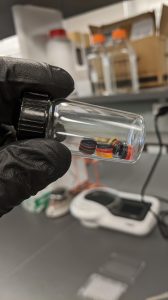Two biomedical engineering professors at the University of Mississippi have begun developing a drug delivery device that could help people who suffer from treatment-resistant depression.
Glenn Walker and Thomas Werfel are collaborating to develop devices for intermittent release of LSD and related drugs. The two-year research project is being funded through the Pilot Project Program under a five-year grant (P30GM122733) awarded to the School of Pharmacy by the National Institute of General Medical Sciences, National Institutes of Health, supporting the Center of Biomedical Research Excellence in Natural Products Neuroscience or COBRE-NPN.
Treatment-resistant depression is a form of depression that does not respond to standard treatments.
“The purpose of this project is to see if it would be feasible to create a small, implantable drug delivery device that could treat patients with treatment-resistant depression,” said Walker, professor of biomedical and electrical engineering and the project’s principal investigator.
“In this project, we will create drug delivery devices and test them in the lab.”
Walker said some evidence shows that very low levels of drugs such as LSD might be able to treat patients with treatment-resistant depression. However, since LSD is easily abused, the researchers need to come up with a way to deliver doses that would prevent abuse by patients.
Finding a creative solution for treatment-resistant depression is necessary because the disease has limited effective therapies, said Werfel, assistant professor of biomedical engineering and co-investigator.
“The therapies that are effective are very intrusive, requiring many repeat visits to the doctor and lengthy procedures that necessitate psychological support by a clinical staff,” he said. “We are proposing to develop a long-term, potentially curative therapy. It involves using a biomaterial implant to control the release of classical psychedelics (e.g., LSD and psilocybin).”
Basically, instead of patients taking a psychedelic drug by mouth, which isn’t feasible with a psychedelic because of such issues as compliance and abuse, they would have a device implanted, which would deliver the drug “on demand” at a preprogrammed rate.
“We also wanted to make sure that patients would receive doses on a regular schedule, about every three days,” Walker said. “Our device – the focus of this project – solves both of these problems.
“Our ultimate vision for this idea is that a patient with treatment-resistant depression would go to the doctor’s office, get a device injected, and then they would not have to worry about taking their medication for the next several months.”
The devices are currently larger than what the scientists ultimately would like to implant into patients, but they hope to come up with a solution to that issue later on in the project.
“The goal is to see if we can use microfabrication techniques to miniaturize the devices from about the size of a nickel to something closer to a grain of rice,” Walker said.
Werfel, whose expertise is in drug delivery, will be guiding the in vitro and in vivo biological testing of the devices.
Treatment-resistant depression affects up to 4% of the U.S. population each year. Patients who suffer from it experience extended depressive episodes and higher rates of suicide attempts.
“On average, TRD patients lose 36 workdays per year, six times that of patients with milder forms of depression,” Werfel said. “TRD patients also incur [around] $7,000 more in medical costs per patient per year than non-TRD patients ($29 billion-$48 billion cumulatively). As a result, there is an urgent unmet medical need for effective TRD therapies.”
Classical psychedelics such as LSD and psilocybin have shown benefits for patients with depression for a long time, but the practical issues with implementing a therapy based on Schedule I controlled substances have prevented much progress on their use to treat patients.
The FDA just granted psilocybin “breakthrough therapy” (or cutting-edge-level) status based on exciting results showing that it is more effective than the current standard of care with ketamine.


